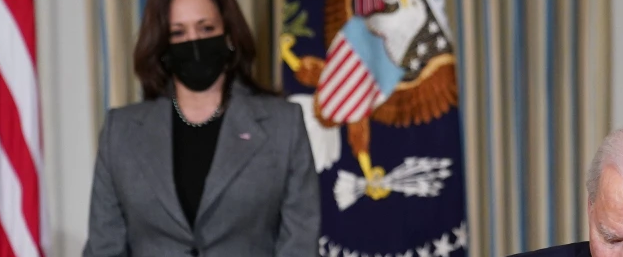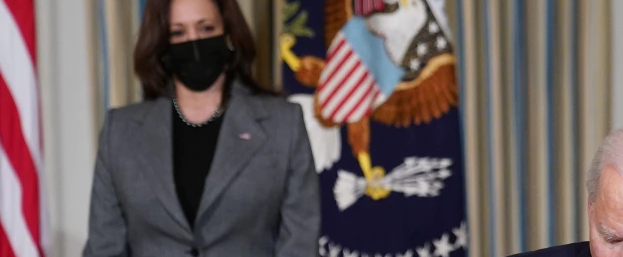
www.counterpunch.org/2021/10/26/how-one-ballsy-senator-stole-a-presidents-gummy-candy/ By Barbara Nimri Aziz October 26, 2021
Where’s Kamala Harris’s tie-breaking vote power? Celebrated as the first U.S. woman vice president, Harris would also head the U.S. Senate, Congress’s more powerful wing. Endowed with casting a critical senate vote, Harris was thereby placed to push through the democratic agenda promised with the Party’s victory last November. It wouldn’t matter if all 50 senate Republicans were opposed to a Democrat-sponsored bill. She would ensure its passage. Humane, racially equitable, climate-transformative, gender-balancing, socially-aware, justice-promoting, anti-war Democratic policies:–all would pass into law. Voting rights legislation would sail through too.
What have we instead? Joe Manchin of Virginia, a once-little-known Democratic senator essentially holding the Democratic Party hostage. He is also rejecting the purported will – not to forget the needs– of 80% of Americans who approve of the most progressive, far-reaching program drawn up by legislators in two generations.
Manchin is as pig-headed, as resolute, as overconfident as any Republican. And he’s usurped Harris’s role as the clinching vote. (His party can’t handle him or his cohort Kyrsten Sinema.)
The Congressional Progressive Caucus’s 100 house members so adroitly managed to ensure Speaker Pelosi linked the two massive infrastructure bills. After a promise that truly progressive legislation would be on the table, look how far the Democratic agenda has slid. By early October, it seems fewer than 50 CPC members would hold the line on what’s called the “Reconciliation” package (whose slippery title I’ll return to.)
Manchin’s loyalty to the fossil fuel industry is to be expected. What elected representative isn’t swayed by their state’s economic priorities? E.g., Senator Sanders’ favoring military spending that assures Vermont’s share of Pentagon largesse. (Moreover, so-called climate friendly corporations are reportedly funding Manchin too.)
It’s not economic self-interest behind this recalcitrant senator’s obduracy. He and Senator Sinema have identified a flaw in the party itself. Call it decorum, congeniality, political correctness. Democrats can’t stand up to a bully. (I witness it working among my courteous and timid county Democrats who tremble when their candidate’s yard sign is defaced.) Then there’s the widespread naiveté that makes many Democratic activists believe theirs is the party embraced by all immigrants and jobless, the party that owns every single Black and Hispanic vote.
Sinema and Manchin, by daring to defy the Democratic leadership, have leapt onto the national stage. As they persist with their obduracy—they seem to be prevailing– they have somehow achieved a kind of heroic status.
In his latest blog Michael Moore has articulated a sentiment I’ve dared express only in private:—a wish that the American ‘left’ (the decent, the smart, the progressive) were possessed by a rage and determination parallel to what propelled others (the dumb, the villainous) into illegal and violent action. He identifies this yearning (hedged by abundant caveats) as “insurrection envy”.

After (after, not before) Trump’s election millions of disgusted Americans bearing pink pussy ears and arty slogans marched through cities and towns across the land. The result of that massive show of goodness? Inconsequential. (Don’t claim the 2020 Democratic victory as an outcome of that action.)
Today, when so much is at stake, with pandemic restraints lifted, Moore asks where’s a parallel show of rage over the downfall of this once-in-half-a-century-plan to restore democracy, avoid climate catastrophe, raise all children out of poverty, care for our elders, moderate medical costs, establish tax equitably, lower community college costs? (If our vocal transgenders were in charge, we’d have surely seen more progress.).
Today we’re informed that taxing provisions to pay for this “soft” bill may be excluded. Why was the wealth tax proposal not inserted into the “hard infrastructure” package rather than into the bill prioritizing health and education, and climate control?
As noted by others, the evasive and constantly changing title of this diminishing bill may be partially responsible for its fate. In desperation, one of its designers, Senator Sanders now speciously labels it ”the damn bill”, as in “pass the damn bill”, and “what’s in the damn bill?” Not a smart choice by Sanders’ aides.
The “reconciliation” label is equally unhelpful. “Build Back Better” hardly improves on that. Neither does “soft infrastructure”.
Maybe these shifting monikers explain why media choose the simpler “$3.5 trillion” tag. A frightening figure, too unimaginable to be attainable.
So why not talk about the bill as just $350 billion, annually, for the coming decade? Juxtapose that with the $768 billion annual U.S. defense budget, with its $24 billion increase just passed by both houses of Congress, every billion of it with hardly a whisper of dissent.
Last Sunday one NPR reporter referred to the bill as Biden’s “domestic spending agenda”, another as the “social safety net and climate plan”. For a few weeks it was just “the climate bill”, probably following heavy lobbying by climate-priority media. Others view it as a taxing proposal. One has to peruse written reports for details, seeking assurance that educational and medical components are really there.
Till today one finds scant reference to how this bill impacts 50 % of the population, namely American woman. Whereas the “hard infrastructure” bill funding roads and bridges will be awarded the construction industry that largely employs men, the advantages for women carried by the “reconciliation” package are not emphasized. Few of its proponents link pre-K funding, elder care programs, expanded health services to massive job opportunities for women, as well as relief for women bearing the burden of child and elder care. CPC leader Pramila Jayapal along with other members of the progressive caucus had proposed a smart and painless compromise. If cuts must be made, they offered, identify some programs to receive funding not for a decade but five years. If they prove worthwhile during that time, they can be refinanced for a second five years. Totally reasonable, unarguably doable. Yet it seems to have gone nowhere.

